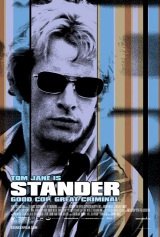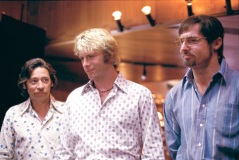| Stander |
| |
 |
South Africa/UK/Canada/Germany, 2003. Rated R. 111 minutes.
Cast: Thomas Jane, Dexter Fletcher, Deborah Kara Unger, David Patrick O'Hara, Marius Weyers, Ashley Taylor
Writer: Bima Stagg (story & screenplay); Bronwen Hughes (screenplay)
Original Music: The Free Association
Cinematography: Jess Hall
Producers: Julia Verdin, Martin F. Katz, Chris Roland
Director: Bronwen Hughes
LINKS |
 ho is Stander?
ho is Stander?
A police captain or a bank robber? A folk hero or a common criminal? A loyal husband and son or a disloyal rebel?
It'd sure be nice if the movie offered an answer.
Here is what we know: In the late ‘70s, Andre Stander, the son of an Afrikaans general, was the youngest police captain in the Johannesburg Police Force. He was also South Africa's most notorious bank robber. Speculation is that he was disturbed deeply by his participation in actions against black demonstrators protesting Apartheid, which motivated him to lash out against The System. Stander embarked on a series of audacious bank robberies, often returning to the scene of his crimes as an investigator. After his inevitable capture, he broke out of jail with two other inmates, Allan Heyl and Lee McCall, and the trio embarked on a series of even more audacious bank robberies.
Stander shows all these events, boasting some impressive sequences. The film opens in 1976, with captivating overhead vistas of South Africa, from opulent suburban communities to horrendous shantytowns. The costumes and the look of the film, heavy in yellows and browns, expertly recreate the era without caricaturing it. The ten-minute set piece portraying the Tembisa student uprisings (at which Stander kills unarmed demonstrators) is one of a kind. Director Bronwen Hughes (Harriet the Spy, Forces of Nature) extensively researched the events, and employed 1300 extras and a South African crew to recreate the riots faithfully, on location. She presents them not as a linear chain of events that inevitably leads to violence, but more realistically, as a series of small, unconnected confrontations that build and ebb until finally, one goes too far. After it's all over, a shell-shocked Stander (Thomas Jane) assaults two of his subordinates for asking him if they will get overtime “on this.”

Dexter Fletcher, Thomas Jane, and David Patrick O'Hara are the Stander Gang in Stander. |
Jane, who has a healthy star quality despite not being a household name, is a solid choice for Stander. He's proven himself capable in action movies (The Punisher, Deep Blue Sea); he's proven himself capable in dramas (Boogie Nights , HBO's 61*); and he's proven himself reasonably competent in an occasional comedy (The Sweetest Thing). In Stander he gets to draw on all these skills, ranging from intensely dramatic scenes (the Tembisa riots, confrontations with his old-guard father and an unsympathetic judge) to scenes involving a little comedic flair (the brazen and often amusing robberies). His only weakness seems to be his imitation of the notoriously difficult South African accent (Jane is American), which pales next to the work by Canadian Deborah Kara Unger, who plays Stander's wife Bekkie. Her accent is so good that according to Hughes, it fooled the South African post-production crew.
There's no problem with either the direction or the acting. The only problem, really, is one most biopics suffer—lack of focus. Like so many other biographies, Stander is so busy portraying events that it fails to explore character. Stander dispenses with unnecessary dialogue and doesn't posit facile explanations, which is good, but it fails to put you, the audience, into Andre Stander's skin. Hughes shows you what Stander did, but with a few exceptions, she doesn't immerse you in his point of view. The exceptions are notable, however, and therefore worth mentioning: the Tembisa riots; the scene where Stander refuses to participate further in Riot Duty to the detriment of his career; the scene preceding his first robbery in which he angrily remarks, “You know, a white man could get away with anything today, while the police are watching the blacks.”
Nonetheless, the film fails to leave a clear impression of who Stander was, beyond that he was a man of action, a man of contradictions, and a man who liked to hang out naked. Since he keeps most of the money he steals, he's less Robin Hood than a guy who just needs to let off steam…a lot of steam. It might have helped if Hughes had shown a more accurate history of Stander's relationship with his wife. (The film opens with their wedding, but Hughes doesn't spell out that they're getting married for the second time.) That said, Stander is obviously an interesting guy, and that much Hughes captures. Though the central question remains unanswered, Stander is an entertaining person with whom to spend two hours.
Review
© August 2004 by AboutFilm.Com and the author.
Images © 2004 Newmarket Films. All Rights Reserved.


